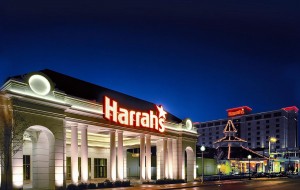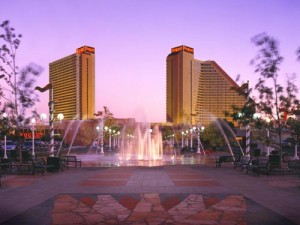Easter, if you can believe it, is being blamed for a 2% decline in Illinois casino revenues last month. Argosy Belle continued to be the problem child of the state, down 13% (to $5 million). Slot-route competition continued to do a number on Boyd Gaming‘s Par-A-Dice,  which fell 10%, to $8 million. Harrah’s Joliet ($17 million) and Harrah’s Metropolis ($7 million) were flat with last year. GLPI‘s Casino Queen ($10 million) also held steady. March was a mixed bag for Penn National Gaming, which was up 2% ($11 million) at Empress Joliet but 5% down at Hollywood Aurora ($10.5 million). Market-dominating Rivers Casino ($37 million) was off 2%. Independent Jumer’s Casino Rock Island ($6.5 million) slipped 4%. Foot traffic statewide fell 4%, as customers spent less to boot.
which fell 10%, to $8 million. Harrah’s Joliet ($17 million) and Harrah’s Metropolis ($7 million) were flat with last year. GLPI‘s Casino Queen ($10 million) also held steady. March was a mixed bag for Penn National Gaming, which was up 2% ($11 million) at Empress Joliet but 5% down at Hollywood Aurora ($10.5 million). Market-dominating Rivers Casino ($37 million) was off 2%. Independent Jumer’s Casino Rock Island ($6.5 million) slipped 4%. Foot traffic statewide fell 4%, as customers spent less to boot.
* The Easter Bunny didn’t make off with any casino revenue in Maryland, where revenue was up 7.5% for the second-richest month ever. Horseshoe Baltimore won the “most improved” ribbon, its business increasing 12% to $28 million. That still put it well behind $54 million-grossing Maryland Live (up 5%), while Penn’s hard-luck Hollywood Casino Perryville ($7 million) rose 8%. Ocean Downs ($4.5 million) posted an $11 million increase. There’s still plenty of elasticity in the Free State for MGM National Harbor when it debuts.
* Evidently “The Park at MGM Grand” didn’t fly with focus groups as a successor to Monte Carlo. According to MGM Resorts International CEO Jim Murren, the title “is not ready for show time.” Ditto renaming Luxor as “Pyramid.” Still, “We are not going to name [Monte Carlo] something from somewhere else. Those days are over,” Murren told the Las Vegas Sun. The company is planning to reinvest in its bargain-market projects, promising capex infusions into Excalibur and Luxor … but not Circus Circus. Call me a pessimistic, but I don’t think the clown casino figures in MGM’s long-range plans.
* Sparks has been the focus of regulatory scrutiny this week. The Financial Crimes Enforcement Network laid a $1 million fine on the previous ownership of what used to be John Ascuaga’s Nugget for running a disaster area, at least where anti-money- laundering efforts are concerned. FinCEN concluded that with “blatant disregard” from top to bottom, the Nugget “willfully violated the (Bank Secrecy Act)’s program, reporting, and recordkeeping requirements.” The laxity occurred during ex-CEO Michonne Ascuaga‘s watch, prompting her resignation from the Nevada Gaming Commission and complicating the sale of the Nugget to Marnell Gaming.
laundering efforts are concerned. FinCEN concluded that with “blatant disregard” from top to bottom, the Nugget “willfully violated the (Bank Secrecy Act)’s program, reporting, and recordkeeping requirements.” The laxity occurred during ex-CEO Michonne Ascuaga‘s watch, prompting her resignation from the Nevada Gaming Commission and complicating the sale of the Nugget to Marnell Gaming.
Although the Ascuaga family professed itself “satisfied that this matter has been resolved,” FinCEN Director Jennifer Shasky Calvery was less forgiving. “Sparks Nugget had a systemic breakdown in its compliance program. Despite the fact that it hosted convicted embezzlers and had been repeatedly alerted to suspicious transactions by its own compliance manager, Sparks saw no need to re-think its defenses.” With the FinCEN nastiness out of the way, the Nevada Gaming Control Board approved Marnell’s purchase of the Nugget. “I think it’s good to see this kind of cross-regional operation take hold,” said board member Terry Johnson of the Laughlin-based Marnell’s gaining of a Reno-area foothold.
 CEO Anthony Marnell III promised regulators an improved FinCEN-compliance regime at the Nugget. He also pledged $25 million in capex maintenance, including the replacement of the casino’s slot machines. “The property is in desperate need of capital. There’s an opportunity to improve the operations of the business substantially,” Marnell told the NGCB. In other business, it was in with the new, out with the old, with a new owner being improved for the tiny, off-Strip Stage Door casino and the Riviera being deregistered, which gives us a nostalgic pang of regret.
CEO Anthony Marnell III promised regulators an improved FinCEN-compliance regime at the Nugget. He also pledged $25 million in capex maintenance, including the replacement of the casino’s slot machines. “The property is in desperate need of capital. There’s an opportunity to improve the operations of the business substantially,” Marnell told the NGCB. In other business, it was in with the new, out with the old, with a new owner being improved for the tiny, off-Strip Stage Door casino and the Riviera being deregistered, which gives us a nostalgic pang of regret.
* That bane of law enforcement, illegal Internet “sweepstakes” cafes has spread to the heart of Arizona. The state isn’t notably starved for gambling, so it’s hard to see why a hole-in-the-wall joint would prosper when there are so many tribal casinos around.
* Glass half-full or half-empty? The tendency of visitors to Macao to stay more than one night seems to be increasing but fewer gamblers are coming from China, prompting greater reliance upon the Taiwan market (somewhat of an irony, given Beijing‘s high-handed attitude toward what we used to call Nationalist China). Also, the Macanese gambler is turning into a low roller, with more of them (52%) keeping their gambling budget to $125, whereas only 38% did so a year ago. (The average Las Vegas gambler spent $578.54 last year.)


How about “The Park Across The Street From MGM Grand”?